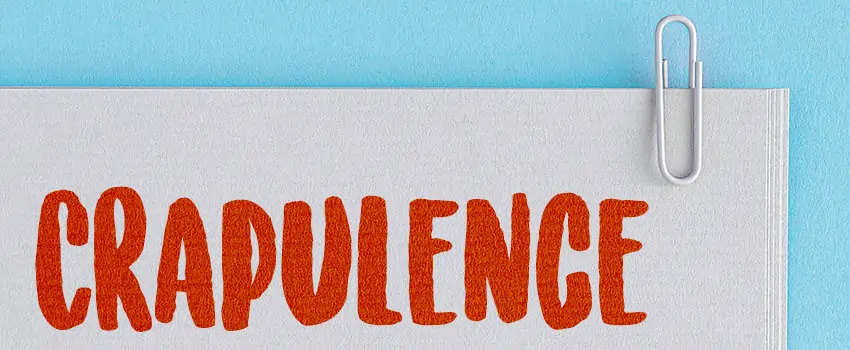
Sweet and Spooky Superstition Origins
Whether you’re the logical type who only knocks on wood at front doors, or wary individual who wouldn’t dream of scheduling a job interview on Friday the 13th, Halloween is a time when superstitions take center stage. No matter where you are on the superstitious-versus-skeptical spectrum, these beliefs can teach us a lot about history and culture. So here’s a little Halloween history lesson on the origins of six of the most-common superstitions.
It’s pretty traumatizing to see your well-researched paper marked up with red edits everywhere! Perfect your paper before turning it in with the BibMe Plus grammar and anti-plagiarism tool. Or start off slow by learning the basics of verbs, pronouns, nouns, interjections, and more!
Fear of Friday the 13th
Fridays make most of us go “Woo hoo!” since it’s the end of the school or work week. But, for those who suffer from paraskevidekatriaphobia, Fridays are something to fear when they happen on the 13th day of the month.
Friday has long been considered bad luck because it is the day of the week Jesus died. In Britain and ancient Rome, Friday was also known as Hangman’s Day because it was usually when prisoners sentenced to death were hanged. Fear of the number 13, or triskaidekaphobia, can likewise be associated with Christianity because Judas, the apostle who betrayed Jesus, was the 13th guest at the Last Supper. Numerologists also say 13 gets a bad rap because it falls directly after 12, which is considered a complete number—there are 12 months in a year, 12 signs in the zodiac, 12 numerals on a clock, etcetera. So the number 13 is beyond complete, which is freaky, especially when it falls on a Friday.
It’s Bad Luck to Walk Under a Ladder
How can something so average be so intimidating? It’s scary enough to make most of us walk around—and not under—a ladder without even realizing it. Well, it all started in Egypt.
In ancient Egypt, the triangle—the shape formed by a ladder leaning against a wall—was considered sacred because it represented the trinity of the gods. So traipsing through the triangle was blasphemous. Later, Christians adopted the superstition, applying it to the Holy Trinity. And because there was a ladder propped against Jesus’ cross, they equated a leaning ladder with betrayal and death.
Walking under a ladder is also thought to be bad luck because it resembles a gallows. In fact, criminals sentenced to death in 17th century England were forced to walk under a ladder on their way to the hangman. Finally, there are perfectly practical reasons for not strolling under a ladder, which could hold a handyman and heavy tools or wet brushes and buckets of paint.
A Black Cat Crossing Your Path Brings Bad Luck
This superstition seems to also have roots in ancient Egyptian culture, where people revered cats of every color and actually thought a black cat crossing your path was a harbinger of good luck to come. But black felines fell out of favor in the Middle Ages, when many thought the animals served as “familiars” of witches or were witches in cats’ clothing—certainly not something you’d want to cross. Puritans brought the belief to America, where black cats and witches are still seen as partners in Halloween decorations and Hollywood productions.
Knocking on Wood Helps Ward Off Bad Luck
“I haven’t failed a test this semester, knock on wood.”
“Yes! I found the perfect study spot no one else knows about yet, knock on wood.”
These days, we knock on wood after talking about some fortunate event or circumstance to keep their good luck going. The origins of this practice date back to a time when trees were worshipped or mythologized in many cultures. For instance, pagans in Europe practiced noisy rituals in the forest to chase evil spirits away and to keep those spirits from catching wind of good luck and turning it sour. Other tree worshippers laid their hands on a tree when asking for a favor from the gods that lived inside it or to give thanks for a run of good fortune. Over time, these superstitions have evolved into knocking on any wooden surface to keep bad luck at bay.
Finding a Four-Leaf Clover Is Good Luck
The common clover has long been seen as a sign of good things to come, with the Celts viewing it as a symbol of spring and rebirth. Later, Saint Patrick used it as a visual to explain the balance between the Father, Son, and Holy Spirit while converting people to Christianity across Ireland.
But the more rare four-leaf clover has an equally storied history. Druids, who were the educated class among ancient Celts, believed carrying one allowed them to spot demons and ward off evil spirits. Some even believe that Eve carried a four-leaf clover from the Garden of Eden when she left. So people who find a four-leaf clover today are carrying a little piece of paradise in their pockets.
Breaking a Mirror Brings Seven Years of Bad Luck
"Mirror, mirror, on the wall, are you bad luck after all?"
Sure, sharp shards of glass are dangerous, but why do some people believe breaking a mirror will bring bad luck long after the glass is swept away? The origin of the superstition dates back to the days when people thought mirrors provided a reflection of not just physical features, but your soul. So if you broke a mirror, you’d also do damage to yourself. Though seven is considered a significant and often lucky number in many cultures, it’s bad luck in this case because the Romans believed a person’s health ran in seven-year cycles. Therefore, it would take that long for your soul to repair itself and help you shed your shattered luck.
So if you plan to attend a Halloween party this year, be careful not to break any mirrors while donning your costume. If you do, maybe you should keep an eye out for four-leaf clovers to help turn your luck around.
Like this article? If you use it in an assignment, you can cite it and nearly any other source with our BibMe citation tools! Easily generate citations in MLA formatting, APA, Chicago format, or another style.
...
10 Next-Level Study Tips for Acing Tests
By Caleigh Propes
Sometimes studying can be rewarding, but usually it’s just really tiring! Most of us dread those hours going over facts for a history exam or working out problems for a math quiz. Use the tips below to make studying just a little bit easier, and see your confidence skyrocket!
1. Make a Playlist
While jamming to your favorite top 40 songs might make studying more fun, studies show that classical music is actually better to listen to while studying. Try making a playlist of softer piano or string quartet pieces to make you relaxed and give your brain a boost while studying. Also, putting in your headphones will block out any outside noises that could be distracting you.
2. Consider Your Timing
Think about your own habits. Are you a nocturnal night owl or an eager early riser? Both have benefits—early risers may have more energy, but night owls often have study spaces to themselves. Use your own natural rhythms to your advantage, and plan your studying around when you work best. This may mean getting up earlier or sleeping in later, so make sure you prepare by getting adequate rest the night before a big day of studying.
3. Eat Brain Food, Not Junk Food
Eating while studying can be the best thing ever, but it depends on what you choose to nosh on. Some foods are great study snacks that can keep you energized, while others will make you feel sluggish and heavy. Try eating snacks like air-popped popcorn, fruits and vegetables, and nuts to get the boost you need. Avoid candy, chips, and other empty calories that will make you crash. If you need some caffeine, try green tea. It is full of anti-oxidants and won’t leave you crashing like sugary lattes or energy drinks.
4. Check Online for Materials
If you are taking a class with a lot of other students, it is likely that some of them have posted study resources online, especially if this course is offered year after year. These materials could help compliment your own notes or resources. Also, you can always be proactive and reach out to friends in your class to make a shared study guide.
5. Cite Sources AS You Study
For any project that requires academic sources (like a research paper), be smart about how you handle them and keep a list of sources from the start. It’s easiest to make a bibliography and add to it as you go along, rather than waiting until the end when you may forget an in-text citation or accidentally lose track of a source. Websites like BibMe are great for making citations in APA, MLA, Chicago style format, and other styles.
6. Use Website Blockers
It’s super easy to lose time looking through Instagram or your Facebook feed when you should really be studying. If you’re guilty of this, try using a website blocker app on your computer. You can set which websites you want to block and for how long. You are sure to have a more productive study session if you unplug for a little while, so give this a try if you need just a little nudge to keep yourself on track. Keeping your phone out of reach helps too!
7. Don’t Study in Your Bed or on Your Couch
Your room can be a really convenient place to study. After all, it’s your home away from home! However, nothing is more tempting during a full day of studying than a nap, and staying away from your bed while studying can prevent you from a three-hour detour. Studies even show that students that study in their beds are more likely to have lower GPAs!
8. Set Goals
If you have a big exam coming up, it is important to plan out your studying. Think at least a week in advance, and pencil in times each day with specific benchmarks for your progress. For example, you may want to study three concepts a day or one chapter a day, depending on how your course is broken up. Setting goals and planning in advance will give you confidence, ensure that you have all of the material covered, and keep you from scrambling at the last second.
9. Know When to Study With Friends
Studying with friends can be great! However, it might be better to spend your first few days studying alone, making sure to master each concept. When you feel more confident, consider making a study group to review all of the concepts a few days before a big test. Here, each person can try to explain a concept to the group. After all, the best way to know if you have a topic mastered is to see if you can explain it! Think about choosing classmates with similar work ethics, even if you aren’t best friends. This will help you stay on track and work hard without the distraction of a friend who is a little bit behind you in their progress.
10. Go the Extra Mile
Teachers often hold review sessions or office hours before tests, so make sure to put these dates in your calendar and attend if possible. Teachers are also usually open to meeting with students one-on-one or answering questions via email, so don’t hesitate to reach out. Studying on your own is not always enough, and with the expert at your disposal, don’t be shy! Go the extra mile and use any bonus opportunities to your advantage.
If you’ve got a big test in your future, don’t freak. Studying is a process that can be long and daunting, but once you’ve got it down, it’s so rewarding. With these strategies and a positive attitude, you are sure to ace your next exam and make yourself proud.
Writing instead of studying? Get a little writing help with the grammar and plagiarism checker available with BibMe Plus! If you’re still in the beginning stages of writing, brush up on grammar with our guides on prepositional phrases, possessive pronouns, interjections, and other parts of speech.
...
Antiquated but Awesome Words You Need to Use Right Now
By Devon Brown
Have you ever wished there was a word to describe that delicious smell after rain falls? Actually there is! The English language is many centuries old, and like clothes, words fall in and out of fashion. After some digging, we’ve found a few gems ready to make a come back.
If you’re looking for modern day help on your next paper, our spell checker is at your service.
Ultracrepidarian
They love to hear their own voices even more than being right. An ultracrepidarian is person who shares an opinion on topics they know nothing about.
Example:
Raul is the ultimate ultracrepidarian. He is totally comfortable arguing about European politics even though he knows nothing about them.
Crapulence
Noun
The phrase “to feel crappy” takes on a whole new level of depth and sophistication when it’s converted to crapulence which describes the feeling of discomfort after drinking or eating too much.
Example:
There is nothing like a good game of touch football to work off post-Thanksgiving crapulence.
Fudgel
Verb
Stuck at your desk with nothing to do? Looks like you’ll have to fudgel, which means pretend to work without actually doing anything.
Example:
Sometimes I feel like it is actually easier to do work than to fudgel all day.
Groak
Verb
If one minute you’re enjoying a tasty treat on your own and the next you’ve given half away, you’ve probably been groaked. It’s when someone silently watches you eat in the hope that you’ll share.
Example:
My dog can groak under the dinner table for hours until he is fed a treat.
Petrichor
Noun
The 1960’s are hardly ancient times, but when you find a word that describes that yummy smell of fresh rain on dry soil, it begs to be shared.
Example:
The petrichor in the air more than made up for our shoes getting wet on our walk home.
Callipygian
Adjective
Admiration for a beautiful booty is not a modern invention. Callipygian is an old school, circa 1600, adjective that describes a beautiful butt.
Example:
Her callipygian posterior made an otherwise ugly skirt look very fashionable.
Kench
When a uncontrollable laugh bursts from your face, you can call on the Middle English word kench to describe the experience.
Example:
Vanessa knew the text message would be funny, but not so hilarious that she would kench in church.
Schadenfreude
Noun
We have the Germans to thank for this word that describes the pleasure taken from the misfortune of others.
Example:
Everytime Lori had a difficult day, her boyfriend couldn’t hide his schadenfreude so she had to break up with him.
Scurrilous
Gossip doesn’t have to be true to do damage. With French and Latin roots, scurrilous is a word that describes lies designed to damage a reputation.
Example:
Maxwell would have made a great class president, but scurrilous rumors about his year abroad made it impossible to electhim.
Create citations easily in MLA, APA format, Chicago format, and more with Citation Machine.
...
What to Do in the Fall to Prepare for Summer Internship Season
By Ella Chochrek
During the fall semester, the following summer feels an awful long way away. Nonetheless, some internship applications may be due before the end of the calendar year. Gah!
Even if applications for your dream job haven’t opened yet, it never hurts to get a head start! There are things you can do in the fall to stay ahead of the curve, prepare yourself for summer internship season, and avoid undue stress further down the line.
Here are some things you can do during the fall to help make sure you’re in a position to get the kind of internship you want:
Revise Your Resume
With the fall, back-to-school rush, chances are that you haven’t updated your resume recently. Now’s the time! Review your resume, adding in relevant experience—be it academic, work, or volunteering—that you’ve gotten in the past few months. Also consider whether there’s anything listed that’s now become outdated and should be removed.
If you’ve written your resume or cover letter, it might be a good idea to run it through a grammar checker like the one from BibMe Plus. It’ll examine punctuation, word choice, subject-verb agreement, spelling, proper noun capitalization, and other factors that affect the quality of your writing.
Visit the Career Center
Does your college have a career center? If so, take advantage of this amazing resource! Make an appointment to meet with a counselor and go over your career goals. There may be jobs that fit in perfectly with your skill set that you haven’t even considered, or your school may have great alumni connections that you didn’t know about. In short, there are only benefits and no drawback to visiting your career center.
Research Companies You Find Interesting
Think you want to work at a certain company? Find out more about it by going through job postings! Check out internships.com, search on a browser, or visit a company’s own website to see what types of jobs are available. This way, you can get a sense of what tasks you might be asked to perform—and you can figure out whether your strengths align with what a company is looking for.
Go on Informational Interviews
An informational interview is the perfect opportunity to network with a professional and learn more about their career—and they can sometimes lead to job opportunities down the road. While the person you talk with may not be able to offer you a job themself, there’s a good chance they have other connections within their industry. Plus, you can ask questions you wouldn’t be able to ask in a job interview—like whether the person actually enjoys what they do.
Attend Employer Events
There’s a good chance your college has a career fair in the fall—and you should go. Career fairs are a great opportunity to meet potential employers and to learn about various fields you might be interested in. While you may not walk away from the fair with an internship lined up, you will walk away with more knowledge, and that’s valuable in and of itself. If there are networking events in the area—like information sessions with individual employers—check those out as well.
Start Applying (For Some)
Dependent upon what industry you’re interested in, internship opportunities for the summer may actually open up during the previous fall. In particular, finance and tech internships tend to open on the earlier side. And regardless of industry, if you’re looking to work for a large company, there’s a good chance that jobs will start opening up sometime between November and January.
While you’re still in school, check out Citation Machine for your citing needs. We can help you generate APA citations, build an MLA works cited, a Chicago style citation, and much more!
...
How to Stay on Top of College Applications
By Ella Chochrek
Staying organized during college application season can be difficult. Many students submit applications to as many as 15-20 schools, making it hard to keep track of deadlines. Although applications can often be submitted through the Common Application—which streamlines the process by standardizing many of the needed materials—some aspects of the process can still be confusing and challenging.
With that in mind, here are our tips on how to stay on top of your applications.
1. Create a List of Schools to Apply to
At some point during your junior year, start thinking seriously about what sort of school you might want to attend. Keep in mind grades and SAT/ACT scores throughout this process—create a list that includes only schools that you think you have at least a reasonable chance of getting into—but also consider what kind of college environment you see yourself in. Is it important to you that your school has a successful sports program? Do you want to be in an urban environment? Would you prefer to be close to home? These are the sorts of questions to keep in mind as you compile a list.
2. Decide Who to Ask for Recommendations
Figure out which teachers you want to have writing your recommendations early—and if possible, ask them by the end of junior year. Try to pick teachers from at least two different disciplinary fields; even if you’re planning to be an English major, don’t ask only English teachers for letters. If you have an especially good relationship with a coach or a club advisor who never formally taught you, that person might be a strong choice for a supplemental recommendation letter. Once your teacher has officially submitted the recommendation, write a nice letter thanking them (you can also give them a small gift, like homemade cookies or a scented candle).
3. Start Writing Your Essay Early
Writing college application essays can start to feel like a full-time job if you wait until the last minute. On top of the Common Application essay, you’ll likely have to write supplemental essays for at least some of the colleges to which you apply. Some of the supplements might just be a paragraph or two long, but you’ll want to leave time to write a thoughtful response—and preferably have someone look it over, whether that be a parent, a college advisor or an English teacher (an automated grammar checker might also be helpful). Try to write at least your Common Application essay as early as possible, and if there are any schools you know you wish to apply to, get a head start on those essays, too.
4. Save All Your Files in One Place
Nothing is more frustrating than not finding the essay you know you started writing. Make sure to create a folder with all of your essays in one place, whether that’s on Google Drive or on your computer hard drive. Even if you’ve already sent in an application, you may realize that your essay for one school can be repurposed to work for a prompt posited by another school. Another tip: Create a list with usernames and passwords for any college portals. Different schools use different naming conventions, so there won’t be one standardized username-password combination that works for every site.
5. Don’t Wait Until the Last Minute to Submit
This tip may be self-explanatory, but it’s also one of the most important pieces of advice: send in your applications in advance. No one ever anticipates having technology trouble, but everyone deals with faulty WiFi or outdated software from time to time. Prevent last-minute panic by submitting your applications at least a few days before the deadline.
Before you begin writing, consider strengthening your skills with BibMe Plus’s grammar guides. We cover the basics of the parts of speech, including defining what is a verb, examining possessive nouns, learning about reflexive pronouns, and more.
After you begin writing, you can cite sources quickly with BibMe’s tools for APA format, MLA format, and other citation styles. Try it today!
...
Commonly Confused Words Everyone Should Know
You’re smart. You know this; we know this; and your professor knows this. But is your writing doing you justice?
When you write a paper, as long as you comprehend the coursework and do adequate research you’re bound for an A, right? But simple mistakes and misused words can take a paper that’s great in concept to one that’s mediocre in execution. Let’s avoid some common pitfalls and learn the right way to use the commonly confused words below. If you need more help with writing in general, give BibMe’s grammar check a try!
Ironic vs. Coincidental
Ironic and coincidental are two words that are commonly confused and often used interchangeably—even though they shouldn’t be.
Ironic is an adjective used when something said is actually the opposite of it’s true meaning, or when an unexpected event is the opposite of what was expected—often in an amusing or mocking way.
Coincidental, on the other hand means something random or that happens solely by chance.
Usage Examples:
It is ironic that Mary and Jim decided to go to brunch with separate groups of friends, yet ended up at the same restaurant. It is coincidental that later that day Mary received a gift card from her mom for the very restaurant she went to for brunch. If only Mary had received the gift card earlier!
Lie vs. Lay vs. Laid
Prepare to take notes, folks.
Lie is what a person does when they’re not telling the truth (verb). It is also the actual falsehood told (noun).
Lied is the past tense of when you didn’t tell the truth.
Lie is also what a person does if they are going to go recline somewhere.
Lay is how you use past tense of lie in the sense of reclining.
Lay is what you do to an inanimate object when you put it down.
Laid is how you properly use the past tense of lay when referring to inanimate objects.
Usage Examples:
I don’t like to lie, but I lied to my roommate when I said I was going to go lie down in our dorm room. I decided not to lay down in bed, but I laid my textbooks down on my desk and relaxed with some TV. Now, I’m actually ready for bed, so I’m going to stop watching Netflix and lay my laptop down on my desk beside my textbooks.
We told you it was confusing!
Implicit vs. Explicit
Something you state very clearly, leaving no room for doubt, is explicit.
Meanwhile, implicit is when you indirectly suggest something, instead of saying it outright. It is the perfect opposite of stating something explicitly.
Usage Examples:
Growing up, my parents were quite explicit in forbidding me from listening to explicit music.
While Daniel didn’t admit that he was stressed out, it was implicit given how withdrawn he’d been acting.
Imply vs. Infer
As we previously explained, imply is what the speaker suggests without saying it outright.
Infer is what the listener deduces from what’s being implied.
Usage Examples:
Luke implied that he was going to miss Yolanda’s birthday party because they’d recently had a disagreement. Bella understood, and inferred that perhaps his absence was for the best.
Accept vs. Except
Accept is to believe or acknowledge that an opinion, assertion, or explanation is correct.
Accept also means to willingly receive or agree to something offered.
Except means ‘not including’ or everything other than the following.
Usage Examples:
I can accept that Brian didn’t want to accept my gift. Thankfully, everyone else except Brian was gracious about my generosity.
Affect vs. Affect vs. Effect
Affect (verb) means to influence someone or something.
Affect (noun), typically pronounced with a subtle difference, can refer to an emotional state.
Effect (noun) refers to a change that is the result or due to the influence of something or someone.
Usage Examples:
Bob hoped that he could positively affect his brother’s melancholy affect after losing the big game. But unfortunately, Bob’s chipper mood had no effect on Richard.
Definitely vs. Defiantly
If you’ve seen these words misused in text messages and social media posts, you’re not alone. In fact, it’s a rather common typo.
Definitely means without doubt.
Defiantly means acting with bold disobedience.
Usage Examples:
He definitely was behaving poorly by defiantly ignoring his manager’s orders.
The tricky part? If you accidentally type defiantly when you meant to use definitely, your grammar checker won’t necessarily flag it as wrong since it’s an actual word. So proofreading for context is important, as is reading your papers out loud so you can catch incorrectly used but properly spelled wording.
Supposedly vs. Supposably
Supposedly (adverb) means something is according to what is generally believed.
Supposably, on the other hand is a disputed word that has culturally gained adoption by people improperly using the word instead of supposedly.
Usage Examples:
Miguel is supposedly having a surprise concert on Sunday. “Devin is supposably going to go with me,” Mark explained improperly.
The verdict? Supposedly is the way to go. Always.
There is a plethora of commonly misused words that you may mistakenly use in your coursework. Always be cognizant of these simple mistakes, and always remember the value of proofreading your work.
...